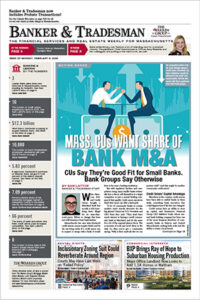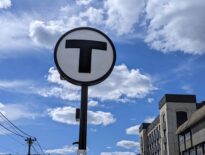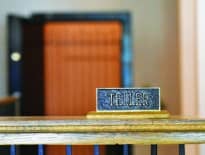
Larry Lucchino, right, and current Boston Red Sox Principal Owner John Henry, center, celebrate the team's 2013 World Series win in a parade through downtown Boston. Photo by Alicia Porter | CC BY 2.0
Former Boston Red Sox President and CEO Larry Lucchino has died at age 78, the team announced Tuesday morning.
Lucchino presided over the club during its historic 2002-2015 period, where it won three World Series titles, and dramatically reshaped neighborhoods in Boston and Worcester.
Under Lucchino’s leadership, chose to renovate and reinvent Fenway Park for the 21st century instead of tearing it down and relocating the team to a new stadium, as proposed under previous Red Sox CEO John Harrington in 1999. The nearly $300 million rehabilitation project was spearheaded by then-team Vice President Janet Marie Smith, and helped kick off a renaissance in the surrounding neighborhood alongside Samuels & Assoc.’s renovation of the former Sears building at 401 Park Drive and its succession of residential high-rises along Boylston Street.
The Red Sox’ parent company, Fenway Sports Group, is planning to build on that in cooperation with WS Development to erect 2.1 million square feet of residential space, offices, labs and storefronts on empty lots and aging buildings close to the park.
Lucchino also bought the Red Sox’s Triple-A Pawtucket affiliate to Worcester after buying the team in 2015, kicking off a downtown revival there. The team – now called the Worcester Red Sox – partnered with Madison Properties to build the new Polar Park stadium in the Canal District next to downtown Worcester and its MBTA commuter rail station. That 1 million-square-foot project also included a recently-completed apartment complex and currently paused plans for an office building overlooking Polar Park’s left field, plus life science space and two hotels on the ex-industrial site. The development fueled nearby projects by other developers and served as a headline example of the ongoing renewal of development interest in downtown Worcester and the city’s new biomanufacturing industrial park near the UMass Medical School.
“Larry’s career unfolded like a playbook of triumphs, marked by transformative moments that reshaped ballpark design, enhanced the fan experience, and engineered the ideal conditions for championships wherever his path led him, and especially in Boston,” Red Sox Principal Owner John Henry said in a statement issued by the Red Sox.
Lucchino’s stewardship of the Red Sox was not his first foray into major league sports, and not the first time he helped rejuvinate an urban area with a ballpark.
A Pittsburgh native who played on the Princeton basketball team – captained by future U.S. Senator and New York Knick Bill Bradley – that reached the 1965 NCAA Final Four, Lucchino went on to Yale Law School and landed a job with Washington lawyer Edward Bennett Williams. Lucchino soon found himself working on Williams’ sports teams, the Washington NFL franchise and the Baltimore Orioles.
Lucchino rose to president of the Orioles, and it was in his tenure that the team replaced Memorial Stadium with a downtown, old-style ballpark that ended the move toward cavernous, cookie-cutter stadiums surrounded by parking lots. Camden Yards became a trend-setter, and Lucchino himself would follow up with a new ballpark for the San Diego Padres, whom he served as president and CEO.
“To us, Larry was an exceptional person who combined a Hall of Fame life as a Major League Baseball executive with his passion for helping those people most in need,” Lucchino’s family said in a statement. “He brought the same passion, tenacity, and probing intelligence to all his endeavors, and his achievements speak for themselves.”
The Lucchino family asked that, in lieu of flowers, donations should be made to the Larry Lucchino Family Fund at Dana-Farber Cancer Institute and the Jimmy Fund, P.O. Box 849168, Boston, MA 02284, or online at http://danafarber.jimmyfund.org/goto/LarryLucchino. Lucchino was a three-time cancer survivor and chairman of the Jimmy Fund.
Material from the Associated Press was used in this report.






